Globalism and Nationalism in Canada
May 9, 2017
Around the world political behaviour is influenced by attitudes about economic development, globalization and trade, and immigration. The election of Donald Trump, support for Brexit, and far-right movements in France and other European countries is often linked to concerns about globalization of trade and political control as well as rapid technological change. Many wonder if Canada is ripe for similar political upheaval.
To explore in greater depth Canadian attitudes towards globalization, technological change, immigration, and diversity, we developed a statistically-based segmentation to describe so-called “nationalist” and “globalist” influences Canada. Here’s what we found:
More Canadians (58%) are “globalist” than “nationalist” (43%) in their general orientation. Sizeable proportions have particularly strong versions of these feelings: 24% could be called “ultra-globalist” and 16% “ultra-nationalist“.
Globalists are in the majority in every region except for Quebec, where there’s an equal split between the two groups. Millennials are more likely to hold globalist attitudes (63%) than Baby Boomers (55%).
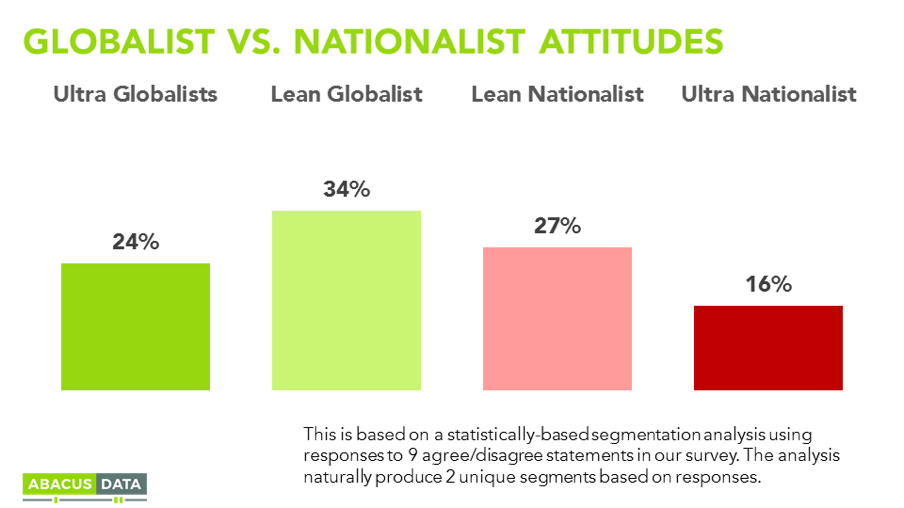
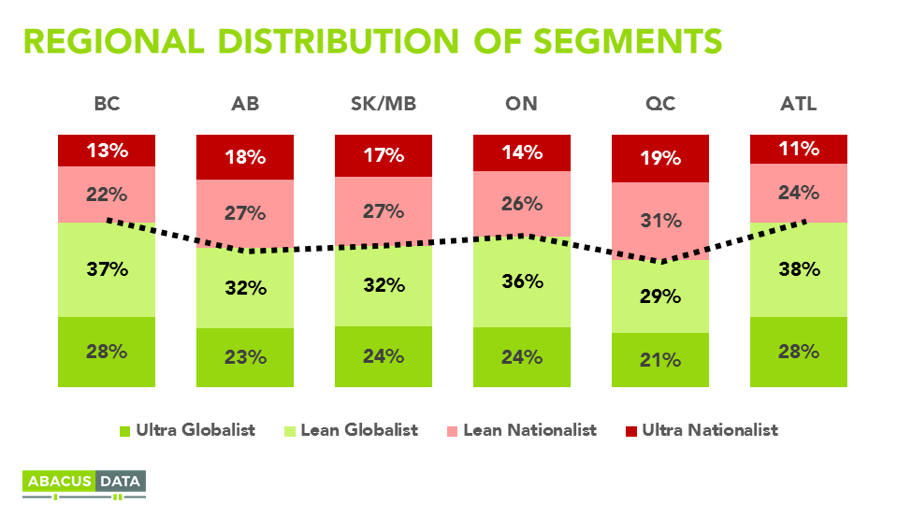
A clear majority of those who identify as upper or upper-middle class, middle class, and working class fall into the globalist group while those who identify as lower class are split between the two. Six in ten of those with college or university education are globalists while the slight majority of those with high school education or less are nationalist.
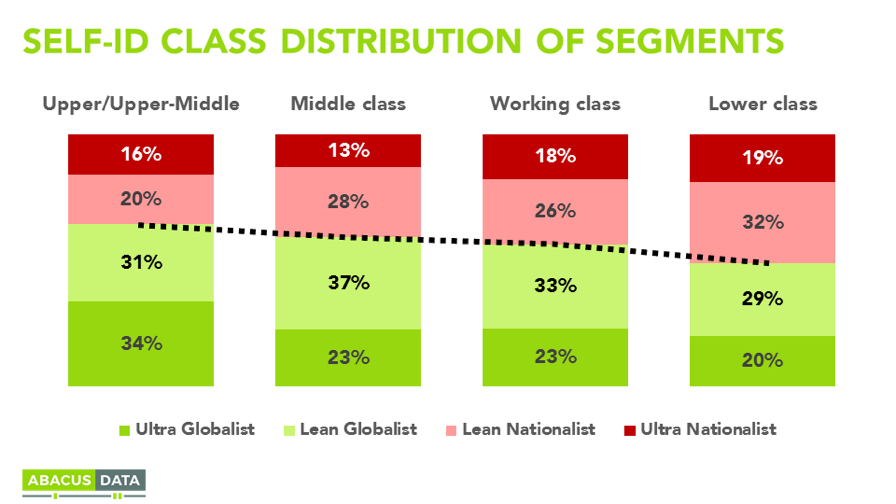
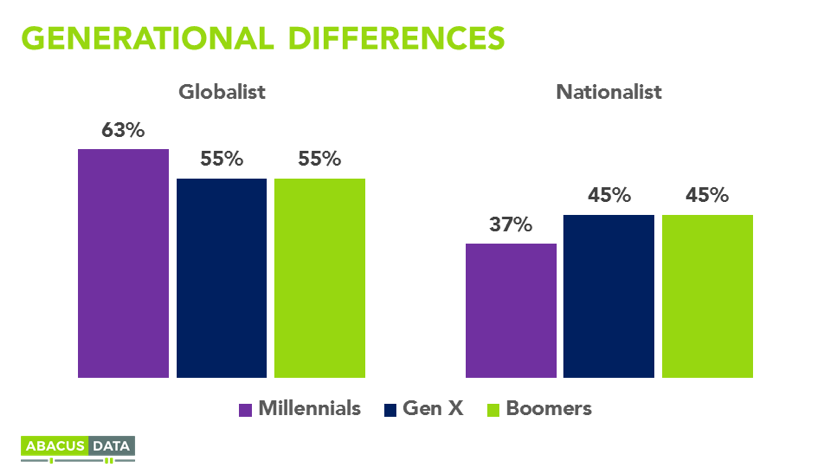
Globalists feel globalization has raised the standard of living for the poor around the world, that Canada should neither stop or slow immigration, that diversity is not a problem in Canada, and that globalization has not harmed their own economic well-being. Effectively all globalists (98%) agree that Canada is a better country because of its ethnic and cultural diversity.
Nationalists feel Canada should slow or stop immigration in the next few years and that there’s too much diversity in Canada. They are more likely to think Canada should try to be more like the US, and less likely to think that globalization and technological change have been good for them personally.
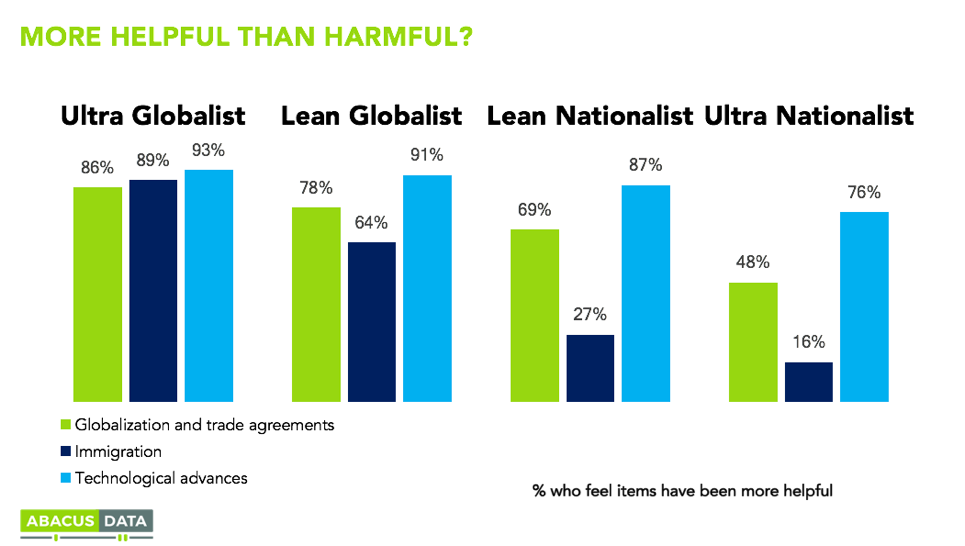
Most globalists feel good about the direction of the country and approve of the job the Trudeau government is doing. Among nationalists, more disapprove.
Nationalism is tied to personal economic anxiety – globalists think their economic prospects are improving, nationalists feel they are getting worse.
The Liberals won all segments in the last election. Current voting intentions show Conservatives with an 18-point lead among the ultra-nationalists and an 11-point lead among the lean nationalists while the Liberals continue to have significant advantages among ultra globalists (33-points) and the lean globalists (9-points).


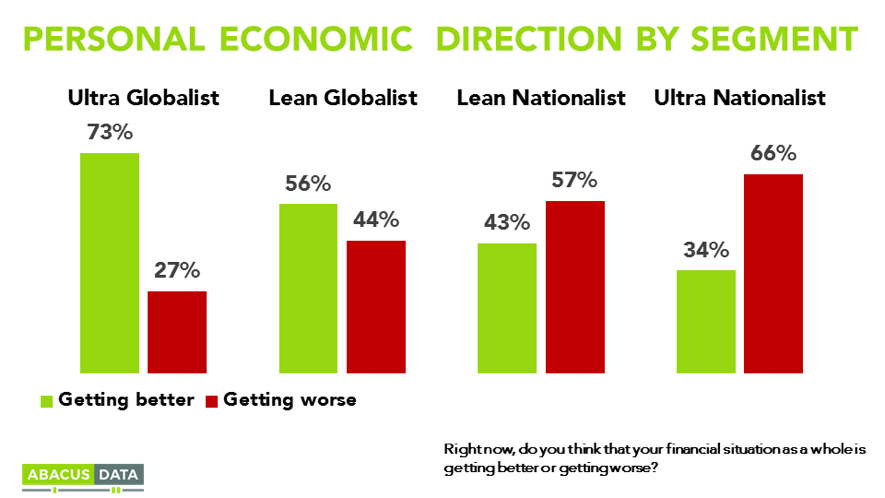
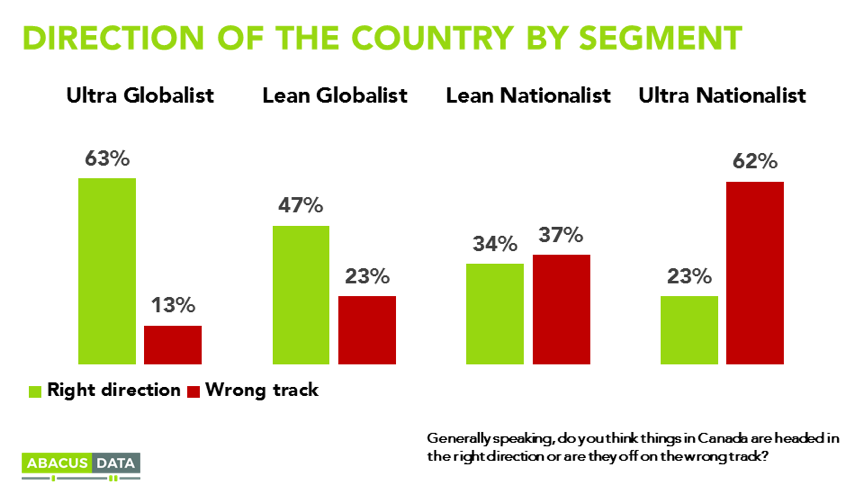
The huge cleavage between the views of ultra-globalists and ultra-nationalists is powerful, on cultural issues (ultra-nationalists are 76 points more likely to think there is too much diversity in Canada) and on globalization (ultra-nationalists are 64 points more likely to feel globalization has been bad for their own economic well-being). However, the gap on the impact of technology is only 30 points, suggesting many ultra-nationalists in Canada do not believe that technological disruption is causing their economic distress.

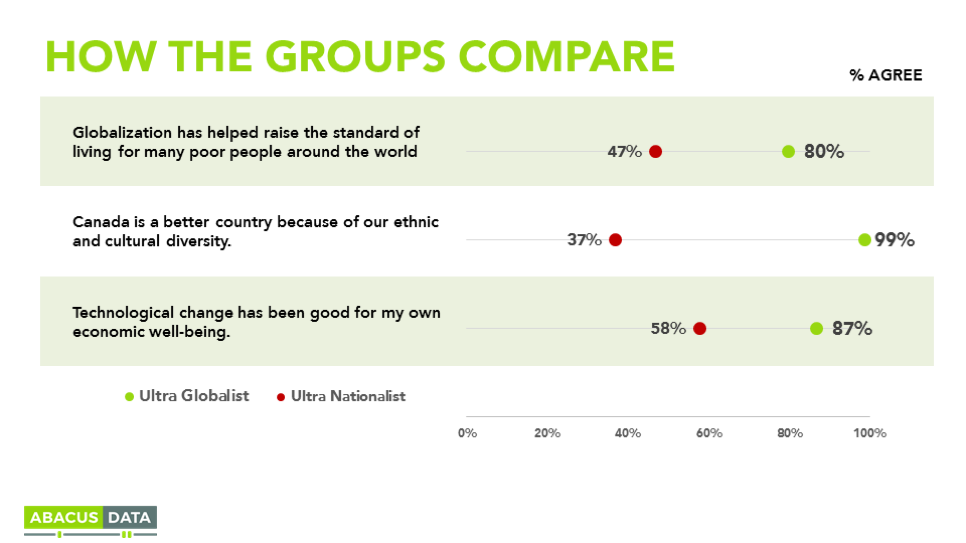
To test the potential linkage to authoritarianism, we asked whether Canada would be better off run by a “successful businessman, someone with strong views, who tells it like it is”, 77% of ultra-nationalists and 62% of lean nationalists agree with this idea, while most globalists reject it.
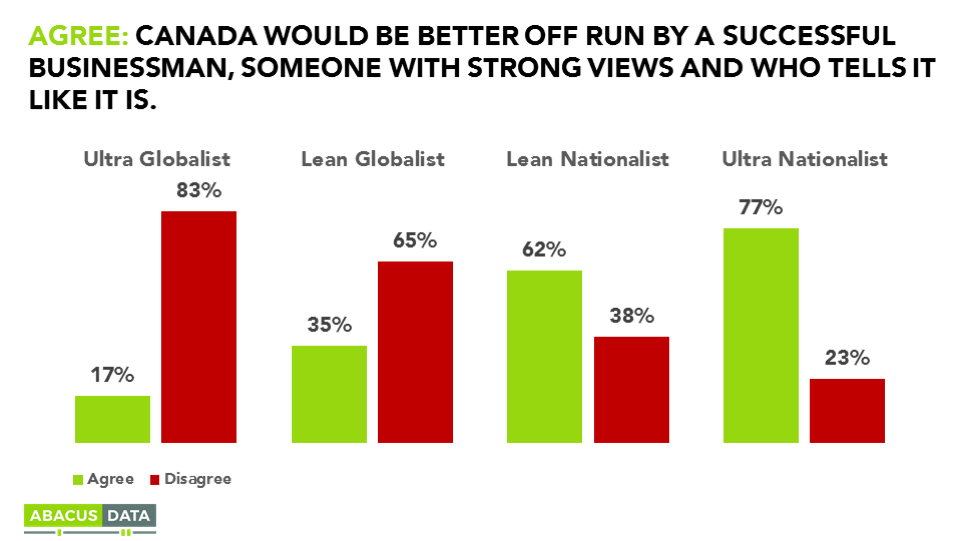
UPSHOT
According to Bruce Anderson: “It would be a mistake to imagine there is no racism in this country, or that economic distress doesn’t build resistance to immigration. But it would also be a mistake to overestimate the size of these phenomena in Canada. The ultra-nationalist 16% are an important political constituency, drawing strength from the themes developed by candidates like Conservative Kellie Leitch and some comfort from the rise of similar political movements in the US and elsewhere.
While economic analysis shows that much economic dislocation has more to do with technological disruption than immigration, people tend to see it as a lesser factor, in part because they embrace technology in their everyday lives, and the specific impacts can be hard to spot. Also, it may simply be easier for some people to blame immigrants or immigration policy than to imagine a more complex and challenging set of forces.
Canadian politics is usually a battle around the centre of the spectrum, with economic confidence playing a huge role. What we saw in the last federal election, and what these numbers confirm again, is that cultural values have also become an important variable in how people see the future of the country, and how they evaluate their political choices. The Liberals can win when they unite those with globalist views; Conservatives struggle if they too closely associate with nationalistic urges. “
According to David Coletto: “The majority of Canadians hold clear globalist attitudes. They see the value of technological change and globalization and think diversity and immigration in Canada are assets, not liabilities. They are typically younger, more urban, and are more optimistic about the future.
But there is a substantial minority who hold different views about the value of diversity, immigration, and globalization to Canada and themselves. The most extreme of this group represents 16% of the population.
These ultra-nationalists overwhelmingly think immigration should be stopped or slowed, that there’s too much diversity in Canada, and globalization has been bad for their lot in life. While less intense in their views, another 27% lean towards the nationalist side and share many of the opinion attitudes about immigration and globalization.
So, is Canada immune to a populist uprising driven by nationalist, anti-immigration sentiment? It’s hard to conclude that it is not, especially given our political system that can allow minority opinions to be translated into governing majorities.
There is a path for a charismatic political leader to tap these anxieties and mobilize the minority into action, especially if globalists split their votes across parties who share their outlook. Given that 44% of Canadians and 68% of nationalist Canadians agree that Canada would be better off run by someone with strong views and who tells it like it is, we shouldn’t take for granted that what happened in the United States or in Europe can’t migrate here.
But anti-globalism is not the majority viewpoint in Canada and generational differences will likely reduce its prevalence in society over time. But this requires a feeling among the majority that globalization, diversity and technological change are things that do more good than harm.”
TAKE OUR QUIZ
Now it’s your turn to find out which group you most align with.
Please answer these seven questions and our model will tell you which group you most likely fit into.
https://abacusdata.ca/globalism_nationalist_quiz/
METHODOLOGY
Our survey was conducted online with 1,500 Canadians aged 18 and over from April 21 to 24, 2017. A random sample of panelists was invited to complete the survey from a large representative panel of over 500,000 Canadians.
The Marketing Research and Intelligence Association policy limits statements about margins of sampling error for most online surveys. The margin of error for a comparable probability-based random sample of 1,500 is +/- 2.6%, 19 times out of 20.
The data were weighted according to census data to ensure that the sample matched Canada’s population according to age, gender, educational attainment, and region. Totals may not add up to 100 due to rounding.
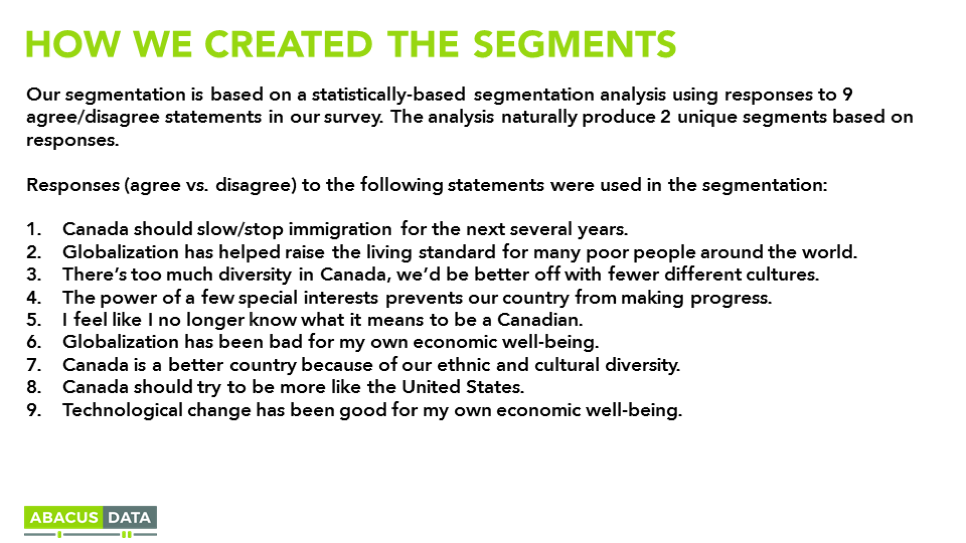
ABACUS DATA INC.
We offer global research capacity with a strong focus on customer service, attention to detail and value-added insight. Our team combines the experience of our Chairman Bruce Anderson, one of Canada’s leading research executives for two decades, with the energy, creativity and research expertise of CEO David Coletto, Ph.D.




